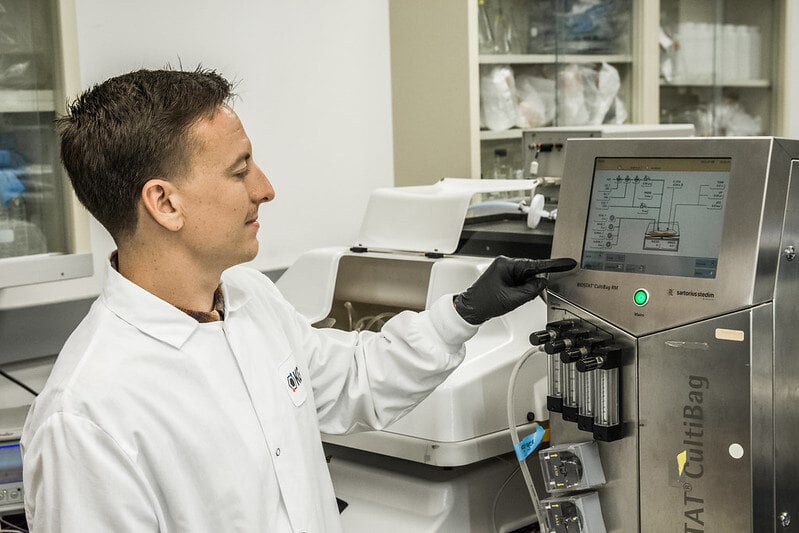Genetic science, a fundamental pillar of modern biology, explores the intricate world of genes, their functions, and how they influence individual organisms and populations over generations. This dynamic field spans various disciplines, including molecular genetics, genomics, and evolutionary genetics. It has paved the way for groundbreaking advancements such as genetic engineering, gene therapy, and personalized medicine. With its roots deeply embedded in the quest to understand the blueprint of life, genetic science utilizes cutting-edge technologies like CRISPR, genome sequencing, and bioinformatics to decode the mysteries of DNA and its profound impact on life's diversity and the mechanisms of hereditary diseases.
The role of a genetic scientist today is more vital than ever, bridging the gap between theoretical research and practical applications that transform human health and the environment. Genetic scientists are at the forefront of medical innovations, developing treatments and cures for genetically linked diseases that were once deemed untreatable. Their work in identifying genetic markers for diseases like cancer, Alzheimer's, and cystic fibrosis has revolutionized diagnostic procedures, enabling early detection and personalized treatment plans. Beyond healthcare, genetic scientists contribute significantly to agriculture by developing disease-resistant crops and environmentally sustainable practices, addressing global food security challenges and climate change.
What is a Geneticist?
Geneticists work in labs, hospitals, and other scientific environments to research genetic conditions and test treatment plans for them. These scientists study genetic material and how it interacts with various mutations and medications, all in the pursuit of helping patients manage and heal difficulties caused by genetic issues.
What Do Geneticists Do Day-to-Day?
A day in the life of a geneticist can look different depending on what type of genetic scientist you are. In general, most days might go something like this:
Morning Habits of Genetic Scientists
Most geneticists working in a lab environment start their day at the incubator, reporting on and observing bacterial growth and tests they left overnight. They can apply this information to their core lab work at their benches throughout the day, hypothesizing and tweaking their experiments until they achieve the desired results. Throughout the day, geneticists keep their laboratory notebooks up to date with a detailed account of all they do.
Midday Genetic Research
Most geneticists work in labs with other genetic professionals, so they may spend some of their days engaging with their group project partners and collaborating on their projects together. Labs may have all-team meetings where geneticists meet with biologists, chemists, and other professionals in scientific disciplines to discuss their work.
Geneticists also spend their days engaging with their ongoing projects, balancing existing research efforts with new project ideas. To keep their work moving forward, they run experiments and image their results to further research their hypotheses' effects.
An Afternoon as a Genetic Scientist
A benefit of becoming a geneticist is that they often have autonomy in research. They can craft their own procedures and projects and track their progress. Some geneticists also spend parts of their days researching what their peers have found in their recent work and keeping up with the latest in genetic research.
The end of a geneticist’s day can often be spent finalizing the lab book entries of that day and planning for the next day’s work, including setting up tests to incubate overnight.
What are the Responsibilities of a Genetic Scientist?
Beyond pure lab work, genetic scientists have other responsibilities related to patient care. They diagnose and treat genetic diseases, write grants and academic papers for their research, and supervise and direct research teams. They may also collaborate on long-term projects with scientists in other disciplines.
How Do I Become a Geneticist?
Careers in Genetics
Genetic science has many facets, from forensics and agriculture to anthropology and archeology. Each concentration tackles a different set of genetic problems and aims to solve the mysteries of genes and how they grow and mutate.
What Degree Do I Need to Become a Genetic Scientist?
To become a genetic scientist, you need a master’s degree. Choosing an undergraduate degree in a genetics-related field is helpful, but it’s crucial to choose a graduate degree that aligns with your interests and passions for work in the genetics field. You’ll want to find a program with good graduate outcomes, one with didactic courses and clinical experience, and one with a strong faculty and graduate network.
Master’s degrees in human genetics and genomic data analytics, degrees in genetic counseling, and others are common for those seeking a career in genetics.
Study Genetics at Keck Graduate Institute
The Master of Science in Human Genetics and Genomic Analytics from Keck Graduate Institute is dedicated to the education of innovative genetic counselors who will serve the needs of individual patients, the healthcare system, and the bioscience industry. Our program emphasizes interprofessional collaboration, systematic problem solving, the safe, efficient, and ethical use of technology and biotechnology, and personalized patient care.
The MSGC program will prepare graduates who are leaders among healthcare professionals dedicated to the delivery of advanced, personally optimized patient care and the translation of applied and clinical science breakthroughs to enhance the quality of life. We will advance genetic counseling for the benefit of society through the development of innovative, collaborative, culturally engaged, articulate, and caring genetic counselors.
You can also request more information or start your application.


